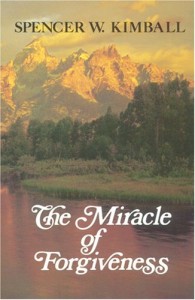Last Friday, as I was cleaning a bookshelf in my room, I came across a copy of The Miracle of Forgiveness.
My mind was brought back to the day when my teenaged self sat across a desk from my bishop; he handed me the book while saying, “I think you should read this.” The book felt as heavy as a Bible to me, and I remember feeling the seriousness of the situation, and thinking that I might have to regard this book as sacredly as scripture for my life at that time.
My specific personal memories of the book end there, however, with the exception of my struggle to read it, and the feelings I have associated with it, which are, essentially this: I will never be good enough. Perfection is required, and I am incapable of achieving that, so my efforts and desires are hopeless. There is no hope for a sinner like me.
Fast-forwarding to present-time, I smiled at how far I’d come: I now know more than to guess that there is no hope. I wondered why I even still had the book in my possession, followed by becoming worried that one of my kids would find it, read it, and feel the same hopelessness I felt as a teenager.
Yikes.
As a mom, I felt frightened that my kids would find and read a book which had been handed to me by a former bishop, even though I can’t remember anything specific about the content of this book. Could I be correct in my line of thinking?
I decided to ask Twitter:
“Cleaning & just found ‘The Miracle of Forgiveness.’ What should I do with it?”
Here are the responses I received:
– “burn it. Like scorched earth.”
– “BURN IT.”
– “hang it in the bathroom and use the pages in place of tp. Big savings!’
– “put it back and we’ll pretend it never happened.”
– “never read it.”
– “I recently told my bishop that that book had false doctrine. He didn’t seem pleased.”
– “My parents read it aloud to the family for FHE over the course of many months. It was brutal. BRUTAL.” “My dad would get mad if we laughed at it. :)”
– “I’ve never read it but curious to the reaction it’s getting!”
– “give it a decent burial.”
– “I had a bishop at BYU while I was single tell me to get rid of it. #bestinterviewever”
– “Yeah, I’ve been advised not to read it. Apparently it’s not on the missionary reading list anymore either.”
– “Women who wear shorts are sinners”
– “What’s so bad about the book? It’s about forgiveness. And miracles. Right?” “Oh never mind, I just read this [link to mormonwiki article].”
To be honest, I thought I’d skim the book, give a synopsis or examples to share here in this post . . . but I simply can’t bring myself to do it. I feel fine about not ever reading that book again.
Do you have experience with this book? Has it made a change in your life? What do YOU think I should do with the copy that I found?


I find it fascinating that the most severe of the reactions come from those who haven’t read the book. Is it harsh? Very much! But then, so were the words of Christ in His time and age. Being culturally removed, the condemning words of Jesus don’t seem to bother us like they really should.
That being said, I’ve read the book and gained a whole lot of insight from it. I spent years being wary of it, but after realizing how much it was quoted in other church literature I figured I’d already partaken of the most painful parts. I probably wouldn’t suggest it as reading for those in the throws of an addiction, but as far as preventative medicine goes, I think the book is great.
My advice: read the whole thing, and understand the purpose of it. I’ve found that the guilt and anguish which follow a study like this are rarely a result of the source, but flow from our preconceived notions and the outside force of the adversary trying to disuade us from moving forward.
I read the book when I was about 19. Horrible experience. Considering that the Savior’s greatest teachings were about love and hope, the book doesn’t fit w/ his teachings. Interesting that what appears to remain strongest w/ you regarding Christ’a words, is the harshness which really only shows up when he condemns those who were so caught up in rules of the Law, they had lost contact w/ the Spirit that gives life. Christ’a emphasis on love , forgiveness and not judging offended those who held power.
I had been told by those recommending the book to be sure and read the whole thing; that the second part acted as redemption for what came before. By the time I was done w/ the first part, I had been robbed of hope and light. The second part failed to give back the hope I had had in Christ. That took years to regain. It’s damaging mentally, emotionally and spiritually. I’ve warned my kids to never read it. All it prevents is a whole relationship with Jesus Christ — the author of love.
I do agree w/ you about the adversary not wanting us to move forward, though. And this book is a great tool in his hands to keep us paralyzed w/ a sense of hopelessness and unworthiness. What saddens me is that the author was Spencer Kimball who, as president of the Church, spoke so many words of love and comfort.
Sue, please don’t misunderstand me; my major take-away from the ministry of Christ is not His harshness. Of course Christ’s message is of redemptive love, forgiveness, and reconciliation! When I think of the Savior I think of his Grace, not judgment. I’m sorry for the experience you had with the book, and all that I can report is that it’s very different from mine. For me, shining light on my imperfections does not lessen my self-worth, it helps me focus on and understand just how great a gift Christ gave to me; it showed just how huge a miracle forgiveness really is.
There are some good things in the book, and I do believe Spencer W. Kimball was a good and well-intentioned man, but as a gay man, I think the chapter dealing with homosexuality is far more harmful than helpful. Really, at a time when I was looking for answers, it made you feel like crap for having feelings that I didn’t ask for and didn’t know how to deal with. I also now recognize that it’s assumptions about homosexual feelings are ignorant. I do not blame Kimball for that. He was writing according to the perceptions of his time, but I know that particular chapter has proved damaging to many a young Mormon struggling with how to deal with their same-sex attractions, myself included. Happily, I’m in a better place regarding my sexuality than I was when I first read this book.
Steven, you make a wonderful point; this book was written _in_ and _for_ it’s time. Outside that context it can be very damaging. Just as ancient scientific texts may not be of much use to modern understanding, and may cause confusion and error, so may taking some aspects of these older books too serious. It’s far more important to listen to what current prophets and apostles say on the matter. We should always realize these books are not scripture. Does that mean they’re not useful? No! But, what it does mean is that we should weigh them against the standard. Nowhere in the scriptures does the Lord condemn us for our feelings, temptations, and understandings. Honestly, I don’t understand why leaders are so eager to hand some book to a struggling youth and act like that’s the cure for everything.
I found a few things that don’t go along with current practice – such as the two people who have been immoral with one another marrying each so as “to keep the sin within the family.” The current practice is for them to break up, repent, and marry others in the temple. But, I later learned that that was a cultural thing, that in Pres. Kimball’s day, it was thought that marrying the other individual was the honorable thing to do. As with many things in the church – the priesthood issue, plural marriage, or whatever you need to take them in a cultural standpoint from what was thought in their time period. We can’t tell a people from years before what they should be thinking just because we think something different now. The church is a church of progression and an evolution of thinking. If we accept being able to progress as people, we need to accept the church to be able to progress as well in that way as well. The book is great. It hits it like it is, but as with many things should be taken in a cultural context.
Well-put!